- Online VoIP Comparisons since 2005
- 26.5+ Million page views: Testimonials
Yealink, Polycom and Cisco phones are among the most popular choices when it comes to deciding which models to choose with your VoIP based phone service. There are many models to choose from with different prices, features and functionality, so a comparison of Yealink vs Polycom vs Cisco phones is often a necessary stage in this purchase cycle.

Let's start by comparing the displays of these different models as after all, the screen is what you'll be using to get access to all those great features. Besides that, some of these displays are truly incredible and can easily impress anyone that steps into your office.
| Yealink Phone Model | Display |
|---|---|
| SIP-T19P IP, SIP-T19P E2, SIP-T21P E2, SIP-T22P IP, SIP-T23P IP, SIP-T26P IP | 132x64-pixel LCD |
| SIP-T27P IP | 3.66" 240x120-pixel LCD |
| SIP-T28P IP | 320x160-pixel LCD |
| SIP-T29G IP | 4.3" 480x272-pixel color |
| SIP-T32G IP | 3" TFT-LCD, 262K colors |
| SIP-T38G IP | 4.3" TFT-LCD, 480x272 pixel, 16.7M colors |
| SIP-T40P IP | 2.3" 132x64-pixel LCD |
| SIP-T41P/S IP, SIP-T42G/S IP | 2.7" 192x64-pixel LCD |
| SIP-T52S IP | 2.8" 320x240-pixel LCD |
| SIP-T46G/S and SIP-T54S IP | 4.3" 480x272-pixel color |
| SIP-T48G/S IP | 7" 800x480-pixel color |
| SIP-T58V IP | 7" 1024x600-pixel color |
| W60P | 2.4" 240x320-pixels color |
Here are some examples of Yealink's lower, mid and high end phone screens (not to scale):
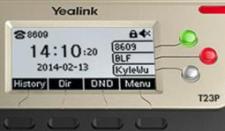
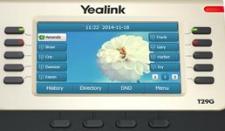
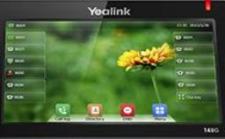
Above (from left to right): SIP-T23G, SIP-T29G, SIP-T48G/S (Touch-screen)
| Polycom Phone Model | Display |
|---|---|
| IP321, IP331, IP335 | 102x33-pixel LCD |
| IP450 | 256x116-pixel LCD |
| IP550, IP560, IP650, IP670 | 320x160-pixel LCD |
| VVX300, VVX301, VVX310, VVX311 | 208x104-pixel Backlit LCD |
| VVX400, VVX401, VVX410, VVX411 | 3.5" 320x240-pixel color |
| VVX500, VVX501 | 3.5" 320x240-pixel color touch screen |
| VVX600, VVX601 | 4.3" 480x272-pixel color touch screen |
| VVX1500, VVX1500 D | 7" TFT LCD color touch screen |
Here are some examples of Polycom's lower, mid and high end phone screens (not to scale):
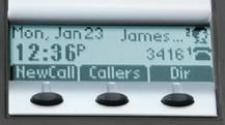
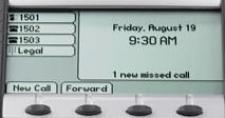
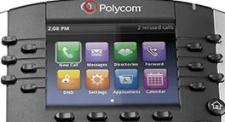
Above (from left to right): Soundpoint IP335, Soundpoint IP560, VVX400
| Cisco Phone Model | Display |
|---|---|
| SPA303, SPA501G, SPA502, SPA504G, SPA508G, SPA509G, SPA512G | 128x64-pixel LCD |
| SPA514G | 144x128-pixel LCD |
| SPA525G2 | 3.2", 320 x 240 Pixel Color LCD |
Here are some examples of Cisco's lower and high end phone screens (not to scale) and note that Cisco uses the same phone layout for all of its phones (except the SPA525G) while enabling different functionality on different models. You can read our review of the Cisco SPA525G2 for additional information on this phone model.
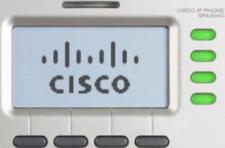
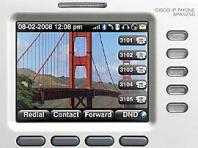
Above (from left to right): SPA504G, SPA525G
Yealink and Polycom also offer video phones. These models are the Yealink T49G and VP530, while the Polycom model numbers that are either video capable or have built in video are the VVX500/501, VVX600/601 and the VVX1500.
It can be extremely difficult to figure out what the differences are betweeen each make and model of IP Phone. If you look at a data sheet you will see lots of features listed that cover information on displays, lines, feature keys, headsets, audio, protocols, provisioning, security, power and even some advanced features in some cases.
If you want to spend hours going through these data sheets then it is highly likely that you will eventually conclude that there is very little difference between makes and models, except for the number of lines supported and the display size and resolution. There are also some other neat features such as Bluetooth support, Video capability, WiFi, USB ports and expansion capabilities that only a few phones have.
In most cases, you just need to know that it supports PoE (Power over Ethernet) and the SIP protocol (or Lync if that is what you need) to ensure that you can actually use the phones in the first place.
So instead of doing a pointless comparison of every feature under the sun, let's take a look at answering some of the more common questions that come up when it comes to choosing between Yealink, Polycom and Cisco phones.
| Number of Lines | Phone Make and Model |
|---|---|
| 1 Line | Yealink SIP-T19P Cisco SPA301 and SPA502G |
| 2 Lines | Yealink SIP-T21P Polycom Soundpoint IP321, IP331 and IP335 |
| 3 Lines | Yealink SIP-T23P, SIP-T40P, SIP-T41P and SIP-42G Polycom Soundpoint IP450 Cisco SPA303 |
| 4 Lines | Polycom Soundpoint IP550 and IP560 |
| 5 Lines | Cisco SPA525G |
| 6 Lines | Yealink SIP-T27P, SIP-T46G and SIP-T48G Polycom Soundpoint IP650 and IP670, VVX300/310, VVX1500 |
| 8 Lines | Cisco SPA508G |
| 12 Lines | Yealink SIP-T29G, SIP-T40P, SIP-T41P, SIP-T42G/S, SIP-T52 Polycom VVX400, VVX410 and VVX500 Cisco SPA509G |
| 16 Lines | Yealink SIP-T46G/S, SIP-T48G/S, SIP-T54, SIP-T56, SIP-T58 Polycom VVX600 |
These are the models that currently support Bluetooth.
Gigabit Ethernet delivers investment protection such that your phones can scale with your network. Two port models enable you to connect you desktop PC to the phone and then connect your phone to the network.
| Ethernet Ports | Phone Make and Model |
|---|---|
| 1 x 10/100MBps | Polycom Soundpoint IP321 Cisco SPA301 |
| 2 x 10/100MBps | Yealink SIP-T19P, SIP-T21P, SIP-T27P, SIP-T40P and SIP-41P Polycom IP331, IP335, IP450, IP550, IP650, VVX300 and VVX400 Cisco SPA303, SPA501G, SPA502G, SPA504G, SPA508G, SPA509 and SPA525G |
| 2 x 10/100/1000MBps | Yealink SIP-T23G, SIP-T29G, SIP-T42G, SIP-T49G, SIP-T5 series Polycom Soundpoint IP560, VVX310, VVX410, VVX500, VVX600 and VVX1500 Cisco SPA512G and SPA514G |
The use of expansion modules can significantly increase the number of lines that a model supports, in addition to allowing the additional keys to be programmed to perform customized tasks.
While you can of course join conferences on any phone, a conference phone is typically recognized as a phone that is designed specifically for being placed in a conference room with the expectation that mulitple people in different locations in the room will be talking. As such, the quality of the speaker audio is critical along with the voice pickup of the microphone. These phones typically include two microphone "wings" that extend the pickup distance in larger rooms.
Conference phones currently available from Yealink, Polycom and Cisco:
Note that Polycom also has a number of analog conference phones available. These are the Voicestation 300, Soundstation 2W, Soundstation 2, Soundstation VTX1000 and the Soundstation Duop which can also function as a SIP based phone.
The Polycom analog conference phones are very popular with on-premise telephony installations that do not use SIP as the signaling protocol. In this case the phones are simply connected to a device that has analog ports and will in turn convert the signaling to digital for IP based communications. An example of this that you may be familiar with in your home is an Analog Telephony Adapter (ATA).
The cost of a single IP phone can range anywhere from as low as $50 to well over $1,000 depending on which make and model you select. If you want to check specific pricing for different makes and models, please visit our IP phone selection guide and that will give you a good idea of what you will likely pay for the phone you are considering.
While price will no doubt be a major factor in determing which model you select, make sure to consider some of the aforementioned features.
The goal of this comparison guide is to help you choose between the many models of phones that Yealink, Polycom and Cisco currently offer. You should now have a clear understanding of what the key differences are across each make and model and are now ready to purchase at the best price you can find. While there are many places such as Amazon that will happily sell you a phone, we recommend that you ideally purchase these through your provider to ensure correct configuration and provisioning, in addition to avoiding any potential gotchas.
Published by WhichVoIP
SIP Port Numbers used by Providers |
NEXT VoIP Modem and Router Compatibility Guide |